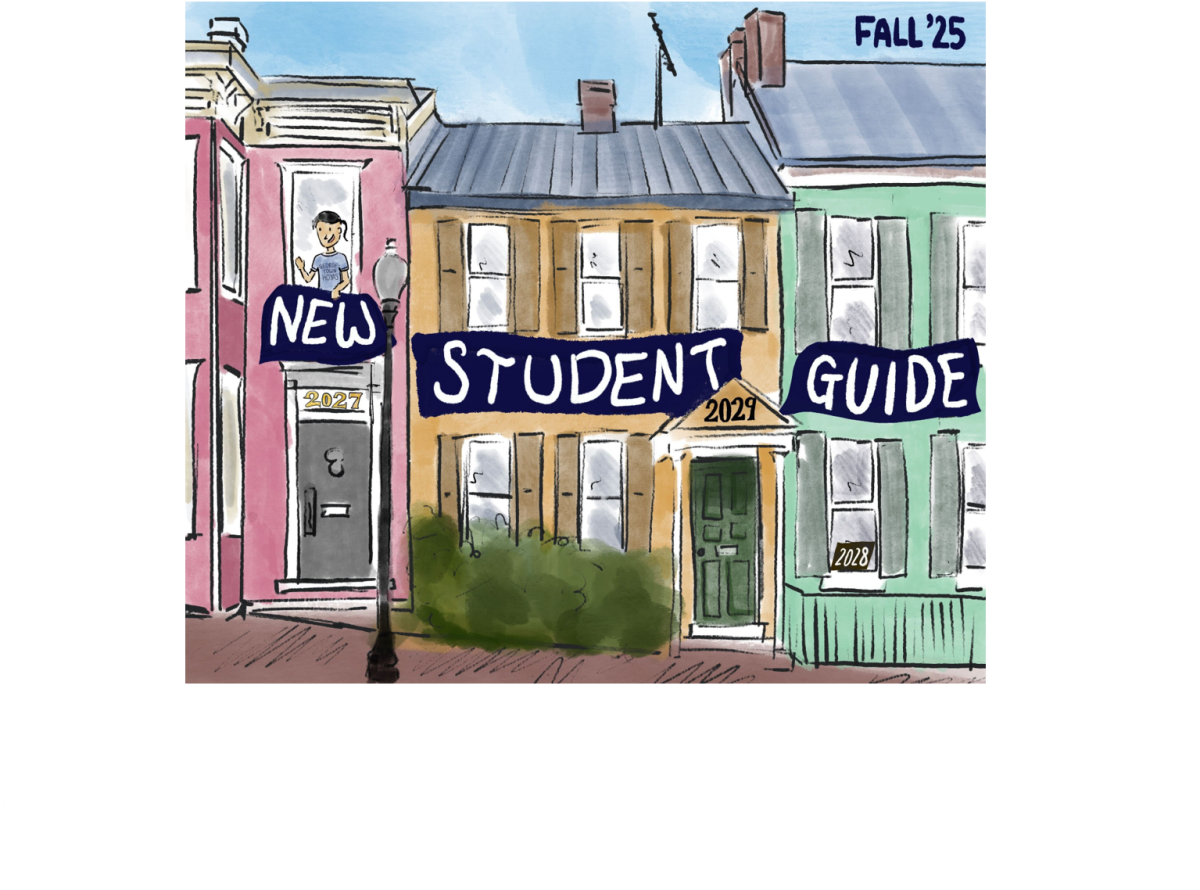Transitioning to college life can be stressful and overwhelming, especially during the first few months as you adjust to a different support system than you’re used to. Fortunately, you don’t have to tackle it on your own! Here’s a guide to the resources and support available on campus to help you out.
Emergencies
The Georgetown University Police Department (GUPD) responds to incidents and security threats on campus. You should save their phone number, +1 (202) 687-4343, into your phone, just in case. You can also reach them via the LiveSafe App, where you can report a crime, request a SafeRide at night, talk to emergency services or access important resources.
The Georgetown Emergency Response Medical Service, lovingly known as GERMS, provides free, confidential and risk-free medical care and ambulance service to Georgetown students on or near campus. Calling GERMS for any reason — including situations involving alcohol, drugs or any illegal activity — will not result in disciplinary action. GERMS is staffed by students trained and licensed in emergency medical services. Save their emergency number, too: +1 (202) 687-4357.
Health Resources
Georgetown’s Student Health Center, located next to Epicurean & Co. beneath Darnall Hall, provides primary care services and appointments. Any student can book an appointment through the center’s website. Check your health insurance so you know ahead of time what fees you may incur. The university’s health insurance plan includes all outpatient visits at the Student Health Center with a $10 copay. Generally, the health center guarantees an appointment within 24 hours during weekdays.
Keep in mind when seeking an appointment that the Student Health Center, under guidance for Catholic health services, does not provide prescriptions for solely contraceptive care. However, it does offer screening for sexually transmitted infections (STIs) and can prescribe hormonal medications for non-contraceptive care. Contraceptive care is available at CVS at 1403 Wisconsin Ave. NW or for free through H*yas for Choice, an independent student organization.
Georgetown also offers a subscription to One Medical, an urgent care and primary care medical service, free of charge for all students. One Medical operates independently from Georgetown, and students can download the app for virtual and in-person care. You can usually make same-day appointments, and there’s a One Medical Office in Dupont Circle, which is a short bus ride from campus.
For mental health support, Georgetown has its Counseling and Psychiatric Services (CAPS) free of charge. With offices located in Darnall Hall, CAPS offers therapy and psychiatry services, and you can get started with a “triage,” an initial evaluation meeting. The HoyaWell app can also connect you with a mental health professional virtually. For mental health emergencies, you can dial +1 (202) 687-6985 to reach CAPS or 988 to reach the national suicide and crisis hotline.
Academic Support
The Academic Resource Center (ARC) provides support for student-athletes and students with disabilities, as well as tutoring, skills workshops and one-on-one meetings for all students. If you need to request accommodations — such as additional time on exams, interpreting services or assistive technology — start by submitting ARC’s request form. You might also find their foreign language drop-in tutoring helpful for many of the language courses Georgetown offers.
The Writing Center — tucked away in a hidden corner next to Midnight Mug on the second floor of Lauinger Library — offers individual peer tutoring to help with writing. The suite of undergraduate and graduate student tutors can work with you on all stages of the writing process, including brainstorming, outlining, drafting or editing, but they’re not proofreaders. You can book an appointment online anytime there’s availability, though make sure to give yourself enough time to address their suggestions before the deadline!
For students in entry-level math courses, the Math Assistance Center offers free tutoring for certain courses. The hours are usually in the evening, and you don’t have to book in advance. The location will be published when the semester begins.
The McDonough School of Business (MSB) also offers MSB-specific peer tutoring that you can sign up for in advance.
Personal and Community Resources
The Office of Student Equity & Inclusion (OSEI) houses university programs supporting students of diverse backgrounds: the Disability Cultural Center, the Women’s Center, the LGBTQ Resource Center, the Community Scholars Program and the Center for Multicultural Equity and Access (CMEA). The OSEI also includes a multipurpose community space located in the lower level of the Healey Family Student Center (HFSC) that opened in early 2024.
Campus Ministry also offers services for religious students of diverse faiths throughout the year. The ministry includes university-wide chaplains, student organizations and residential ministers. Once per week, the ministry hosts a “Chaplains’ Tea,” where students can informally join interfaith ministers.
The Office of the Student Ombuds provides services to students with personal or disciplinary grievances, operated confidentially by trained students. You can seek a private consultation, informal mediation or group visits.
Georgetown also maintains separate resources for undocumented students and international students, including guidance on changing federal policy. Students can reach out to the respective programs for more detailed direction.
To report sexual misconduct or discrimination, contact Georgetown’s Title IX office through its reporting portal or at +1 (202) 687-4798. To report bias or discrimination, contact the Office of Institutional Diversity, Equity & Affirmative Action or submit a complaint form.
Crisis Support
Georgetown’s Health Education Services provides several confidential resources for students in crisis or difficult situations. Its services for sexual assault, relationship violence and stalking are completely confidential and can be reached at [email protected]. You can reach out to a confidential health care professional, Carol Day, for nutrition, eating disorders and body image issues, as well as sexual health and pregnancy, at [email protected]. You can also contact Patrick Kilcarr, an expert specializing in substance abuse, at [email protected] for issues relating to alcohol or drug use. Concerned friends can reach out to these resources on behalf of community members.
Georgetown also has a dedicated website for sexual assault and misconduct, including resources for immediate care and staff to talk to. Students can choose whether they want to speak confidentially, non-confidentially or semi-confidentially. For emergencies related to sexual assault, dial GUPD and ask for Detective Melaccio.
Student Outreach and Support (SOS) is a non-confidential resource for students in crisis or experiencing complex personal or academic difficulties. SOS can help students navigate campus resources and build a lasting “safety net.” Students concerned about a friend or peer can also refer their name to the Safety Net program. Off-campus resources include the D.C. Victim Hotline, online or at +1 (844) 443-5732; Volare, a victim support group; and the D.C. Rape Crisis Center, at +1 202-333-7273.



